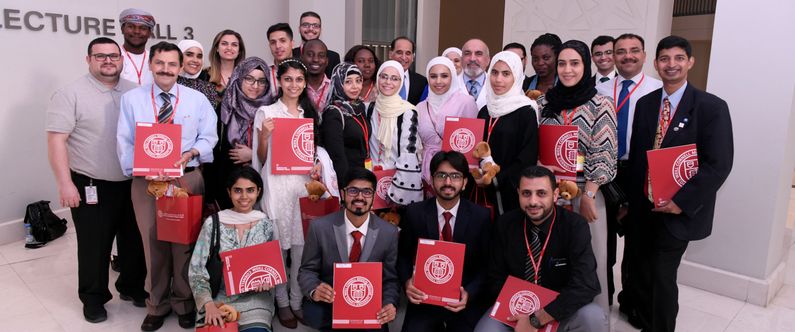International medical students welcomed to WCM-Q
 Students from eight different countries visited Weill Cornell Medicine-Qatar on the International Student Exchange Program.
Students from eight different countries visited Weill Cornell Medicine-Qatar on the International Student Exchange Program.
Students from eight countries across the Middle East, Africa and Asia spent a week at Weill Cornell Medicine-Qatar (WCM-Q) learning about the college’s medical curriculum and healthcare in Qatar.
Sixteen students from medical colleges in Oman, Kuwait, Iraq, Jordan, Palestine, Tanzania, India and Pakistan were hosted for a week by WCM-Q on the International Student Exchange Program. During their time in Qatar the international students were shown the college’s state-of-the-art facilities, saw presentations about WCM-Q’s innovative Six-Year Medical Program, took classes, and met with WCM-Q students, staff and senior faculty, among other activities.
The group also toured a number of a number of healthcare facilities in Qatar, including Hamad General Hospital, Al Gharafa Medical Center, Rawdat Al Khail Wellness Center and Sidra Medicine, where they were able to observe clinical encounters between WCM-Q students and patients during clinical rotations. Near the end of the week the international students and faculty members delivered presentations about the medical education offered at their respective colleges, in which they explained the structure of the curriculum, teaching facilities, and the various social activities on offer.
A highlight of the eight-day trip was a visit to WCM-Q’s Clinical Skills and Simulation Center (CSSL), one of the most technically advanced learning centers of its kind in the Middle East. The students had the chance to work with hi-tech learning aids such as electronic medical mannequins and an anatomage table – a human-sized touchscreen display for visualizing the human anatomy.
Fifth-year medical student Anan Al-Jabri of the College of Medicine and Health Studies at Sultan Qaboos University said: “The skills lab is very modern and impressive, and I like that students at WCM-Q begin learning clinical skills very early in the curriculum, rather than this being left until the later years, which is the traditional model. Coming here has been such an interesting experience.”
Bedour AlHajeri, a fourth-year medical student at Kuwait University’s College of Medicine, said: “I liked very much that the students here have a choice of many different affiliate institutions to do their clerkships, rather than just one hospital, so they have the chance to see many different aspects of Qatari healthcare.”
Each of the participating colleges sent two students and one faculty member on the program, which is coordinated annually by WCM-Q’s Division of Student Affairs. This year’s participating colleges were An-Najah National University of Nablus, Palestine; Dow International Medical College of Karachi, Pakistan; Kasturba Medical College of Mangalore, India; the College of Medicine and Health Studies at Sultan Qaboos University; the College of Medicine of Kuwait University; Al-Zahra Medical College of Basrah University, Iraq; the University of Jordan School of Medicine; and Weill Cornell Bugando, WCM-Q’s affiliate college in Tanzania.
Ms Faten Shunnar, Director of Student Affairs, said “We are very pleased with the spirit of friendship and shared purpose demonstrated by all who participated in the program. The program is a wonderful way to build collaborative relationships with medical schools across the region and the wider world, which is enriching for all involved.”
Dr. Ravinder Mamtani, WCM-Q Senior Associate Dean for Population Health, Capacity Building and Student Affairs, said: “This important program not only ensures WCM-Q is an active member of the regional medical education community, but also gives all involved the chance to share experiences of a whole variety of different approaches to the teaching of medicine. This is a crucial part of the process of continual improvement and the pursuit of excellence in medical education to which we are all committed.”